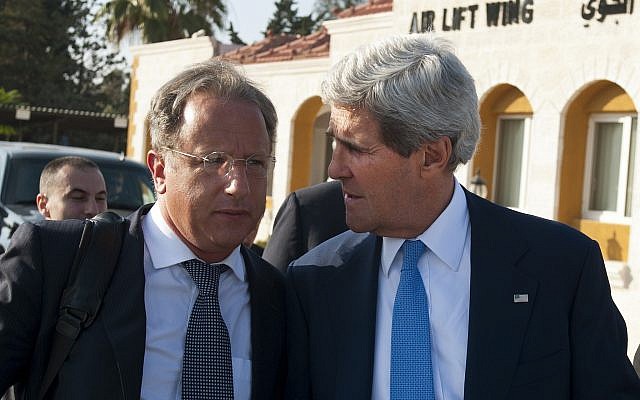
by Lev Tsitrin
The question came up towards the end of the interview with Frank Lowenstein, US Special Envoy for Middle East Peace in the Obama administration — the interview that was occasioned by Secretary Blinken’s long-planned visit to Israel that coincided with yet another spasm of Israeli-Palestinian violence, causing the agenda to focus — at least in public — on the Israeli-Palestinian situation, rather than on infinitely more important discussion of Iran.
Mr. Lowenstein’s assessments were rather frank (though it was interesting to observe how partisanship colors one’s interpretation of history — at 8:20 he observed that “Trump administration had no interest in hearing Palestinian perspective” while, as I recall, precisely the opposite happened: Trump tried to coax Abbas into finally deciding to have peace with Israel, and Palestinians, who did not want to end the conflict with Israel left in place, announced their boycott of the Trump administration, Trump responding in a logical (rather than political) fashion — by cutting huge monetary and diplomatic perks unquestioningly provided under previous administrations just to create an illusion of preserving a political horizon. Thus, Mr. Lowenstein candidly questioned (at 9:40) whether “anybody really believes that two-state solution is viable; a whole bunch of different governments around the world promoting a policy they no longer believe in.” In response to a question (at 11:20) on whether Mr. Blinken will “broach the issue of settlements that are illegal under international law,” Mr. Lowenstein replied that “Israelis don’t listen. The question is, what are you going to do?” BBC’s Razia Iqbal coyly offered a solution (at 11:55): “sanctioning Israel; is that an option if US really does believe that Israel is acting illegally?” Mr. Lowenstein shrugged this off as a non-starter: “No, we are not gonna be sanctioning Israel over this — politically it is very difficult for us to do this here in the US.”
The interview ends right there — but it would have been nice to learn why sanctioning Israel to advance Palestinian cause is nuts. So, let’s take up the challenge — by examining Palestinian goals.
We are being told — and are trying to convince the Palestinians — that what they want is the state in 1967 borders with East Jerusalem as its capital. Somehow it does not occur to those promoting this version of Palestinian dreams, that this is exactly what they had for twenty years, from 1948 when the War of Independence ended, until the 1967 Six-Day war — but did not like. Why weren’t they happy then? Why did they form the PLO — of which Mr. Abbas is the current chairman — in 1964 if there was no “occupation” back then? What were they trying to “liberate?” The state in 1967 borders, with East Jerusalem — which they already had? Obviously not; it is no secret that the PLO was formed to destroy Israel.
Now, what should make us believe that this goal changed? The fact that after the Oslo accords, at the height of Israeli bromance with Arafat who they hoped would lead Palestinians to peace, Palestinians embarked on a campaign of suicide bombings, blowing up Israeli buses? Or that all Israeli peace offers (encouraged and backed by Americans), were declined one after another, in 2000 (starting the murderous intifada), and continuing till 2009, with no realistic counter-offer for ending the conflict ever presented — Arafat claiming that his own people would kill him if he accepted, and Abbas following the same rejectionist track?
Nor is it clear that settlements are illegal under the international law, given that the presumably-occupied Palestinian state never existed –since Palestinians themselves rejected that idea during UN partition debate, as it would have implied recognition of Israel. The American view of the legality of settlements was, in fact, formally stated by the Trump administration, whose own legal analysis concluded that settlements were not necessarily illegal — which, incidentally, renders the assertion that underpinned Ms. Iqbal’s question factually inaccurate.
I understand that BBC has a pro-Palestinian agenda and editorial policy (though I do not understand why) — but at the very least, its hosts should know basic facts when interviewing guests. This isn’t much to ask for — it is a mere professional journalistic prerequisite, a prerequisite that is constantly violated to judge by the frequency with which the false mantra of “Israeli settlements are illegal under international law” is parroted. If BBC aims to be a reputable — that is, impartial — news organization, it should prioritize factual accuracy over un-journalistic (and in fact anti-journalistic) ideological bias and political advocacy, Please do not treat us to lies, BBC — no matter how high-minded the editors’ and presenters’ goals are.
- Like
- Digg
- Del
- Tumblr
- VKontakte
- Buffer
- Love This
- Odnoklassniki
- Meneame
- Blogger
- Amazon
- Yahoo Mail
- Gmail
- AOL
- Newsvine
- HackerNews
- Evernote
- MySpace
- Mail.ru
- Viadeo
- Line
- Comments
- Yummly
- SMS
- Viber
- Telegram
- Subscribe
- Skype
- Facebook Messenger
- Kakao
- LiveJournal
- Yammer
- Edgar
- Fintel
- Mix
- Instapaper
- Copy Link









2 Responses
The Vicious Broadcasting Corporation has a deep incurable anti-Israel bias that portends deadly consequences. Defund it now!
If we must suffer fools now and then, when, to be fair, do we get the fools to suffer badly or gladly?
In the words of El Bobo Loco:
It’s time for the liars /
To immolate their selves /
On their viciousness fed pyres/
As justice for being diseased harlot hires.